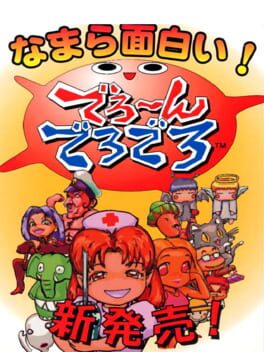Deroon DeroDero
released on Feb 01, 1995
Reviews View More
chat reminded me of two methods of inquiry I often ignore when writing these short little writeups: personnel history and contemporary reviews. For personnel, I'd been using the shorthand of calling things a Sega game, or a Data East game, but corporations don't make games! People do, so I dug in. I knew that crediting of developers was spotty back then, but I was more shocked to realize I was wrong about how I thought the industry worked. I expected the following: a developer wants to make a puzzle game, they call a designer (in-house or not) experienced in puzzle games, they lead a team, and a puzzle game gets made. What I've found so far is the opposite. From programming to designing to directing and producing, most credited people on ochimono games we've played so far only worked on one puzzle game their whole career. Yes, this reflects accurately on the genre niche these games occupy, but moreover there isn't a progression of design development. Companies would simply hire someone they trusted within their department to direct or design or program regardless of their puzzle experience.
For examples: DDD's "Leader" Kimihiko Nakamura had done senior and general programmer for Super Tecmo Bowls I and III respectively, then much much later in his career served as Planner for Ape Escape 3. Lead Programmer Shinichiro Yamamoto undertook Main Programming for DDD as his first credited project, and later made nothing related. Hiroaki Matsui began his career as the staff programmer for this game; he was the one who suggested the blocks "stretch like slime." He'd go on to work extensively as artist, writer, designer, and director for Dead or Alive 1-4, four Ninja Gaiden games, and Tokyo Mirage Sessions #FE of all things, among others. This pattern repeats for every puzzle game we've played that I can find credits for -- except, of course, for members of SEGA AM3, Compile, Arika, and Data East. Putting those exceptions aside, these puzzle games are developmental islands. Their staff and concepts stand alone in the sea of their parent company, save for whatever the developers osmosed from the games they played personally. Maybe this is why few studios implemented garbage cancelling after 1994, despite it improving Puyo Puyo Tsu so drastically over its predecessor. Each company paid developers to reinvent the wheel for the puzzle fad, then moved them along to action games.
The review history is lighter fare. Both GamePro and EGM commented on how "disturbing" the block stretching is, while IGN's reviewer was the only one brave enough to call it "strangely arousing." Also, only IGN correctly identified that the music is good. Stunning to me how much better reviewed Baku Baku Animal was than this. There's a gem to reflect on, though: Sushi-X of EGM noted how easy combing is, derogatorily. Trying to find high-level play on youtube lead me to speedrun videos (under the game's anglicized title, Tecmo Stackers) which simply applied puyo puyo strategy without much use of the tentacle mechanics. I feel like this game has a higher skill ceiling and unique play style out there waiting for it, but there's no proof anybody's found it yet, so, who knows if I know what I'm talking about.
Anyway, this game is good.
For examples: DDD's "Leader" Kimihiko Nakamura had done senior and general programmer for Super Tecmo Bowls I and III respectively, then much much later in his career served as Planner for Ape Escape 3. Lead Programmer Shinichiro Yamamoto undertook Main Programming for DDD as his first credited project, and later made nothing related. Hiroaki Matsui began his career as the staff programmer for this game; he was the one who suggested the blocks "stretch like slime." He'd go on to work extensively as artist, writer, designer, and director for Dead or Alive 1-4, four Ninja Gaiden games, and Tokyo Mirage Sessions #FE of all things, among others. This pattern repeats for every puzzle game we've played that I can find credits for -- except, of course, for members of SEGA AM3, Compile, Arika, and Data East. Putting those exceptions aside, these puzzle games are developmental islands. Their staff and concepts stand alone in the sea of their parent company, save for whatever the developers osmosed from the games they played personally. Maybe this is why few studios implemented garbage cancelling after 1994, despite it improving Puyo Puyo Tsu so drastically over its predecessor. Each company paid developers to reinvent the wheel for the puzzle fad, then moved them along to action games.
The review history is lighter fare. Both GamePro and EGM commented on how "disturbing" the block stretching is, while IGN's reviewer was the only one brave enough to call it "strangely arousing." Also, only IGN correctly identified that the music is good. Stunning to me how much better reviewed Baku Baku Animal was than this. There's a gem to reflect on, though: Sushi-X of EGM noted how easy combing is, derogatorily. Trying to find high-level play on youtube lead me to speedrun videos (under the game's anglicized title, Tecmo Stackers) which simply applied puyo puyo strategy without much use of the tentacle mechanics. I feel like this game has a higher skill ceiling and unique play style out there waiting for it, but there's no proof anybody's found it yet, so, who knows if I know what I'm talking about.
Anyway, this game is good.
